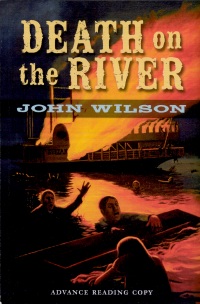| ________________
CM . . .
. Volume XVI Number 2. . . .September 11, 2009 
 |
Death on the River.
John Wilson.
Victoria, BC: Orca Books, 2009.
193 pp., pbk., $12.95.
ISBN 978-1-55469-111-1.
Subject Heading:
united States-History-Civil War, 1861-1865-History.
Grades 7-11 / Ages 12-16.
Review by Emily Sobool.
*** /4
Reviewed from Advance Reading Copy.
|
| |
|

excerpt:
"Don't want to end up like him, eh, Jake, boy?" Billy chatters as he scuttles along behind me. I don't like Billy, but he's right. This is Hell and if I don't learn the rules, I'll end up walking hopelessly out across the dead line or lying like a vegetable in some collapsing lean-to. An unreasoning anger sweeps over me. I feel horribly cheated. I joined up to be a hero, to be like Jim. All right, war's not the way I had expected, but it's not fair that I survived the charge at Cold Harbor only to end up in this place. I spin around and grab Billy by the shirt front. "I'm not going to die here," I snarl. "I intend to survive and go home."
Driven by visions of glory and valour, 18-year-old Jake Clay joins the Union Army in 1864. Yet, his experience of the final year of the American Civil War is far beyond what he could ever have imagined as he is wounded in his first battle and taken to Andersonville, a Confederate prison camp. Jake's experiences at the camp accurately reflect those of the Union soldiers who found themselves captive there, and today the site of the prison is now the Andersonville National Historic Site. The novel does an excellent job of describing the awful conditions of the over-crowded camp, such as the insufficient food rations, daily deaths, and the overwhelming stench of the swamp.
The difficult nature of the novel's subject is eased somewhat by its structure which begins with Jake preparing to journey home after his year as a soldier and war prisoner. While this first chapter makes clear that his experiences were certainly no walk in the park, it also serves to assure the reader that no matter how hopeless Jake's situation may become throughout the story, somehow he will survive. Nevertheless, readers of Death on the River will encounter direct descriptions of death and desperation, from the smell of blood on the battlefield, to Jake's use of a pair of rusty shears to cut off the rotting toes of a fellow prisoner plagued by scurvy.
Death on the River explores the choices that Jake makes in order to survive, showing that remaining alive in a place like Andersonville often comes at significant cost. He teams up with Billy Sharp, a shady character who has no problem resorting to theft and murder in order to get ahead. Billy's lack of conscience is contrasted with Jake's constant struggle with his own sense of complicity as he benefits from Billy's acts, yet does not condemn them. Jake's dreams become haunted with guilt, and on his journey home once freed from the camp, he is faced with a final chance to atone for his choices.
John Wilson has crafted a compelling story that seamlessly incorporates a number of key events in American history. As Jake lives through the experiences of the charge at Cold Harbor, the fight to survive at Andersonville under Henry Wirz's command, the existence of the Raiders at the camp who preyed upon their fellow prisoners and their eventual demise at the hands of the Regulators, and even the disaster on the Mississippi river when the Sultana explodes, these historical events are also brought to life in the imagination of the reader. This sense of connection with the past that Wilson's story inspires is one of the novel's strongest features.
Recommended.
Emily Sobool is a librarian in Vancouver, BC.

To comment
on this title or this review, send mail to cm@umanitoba.ca.
Copyright © the Manitoba Library Association. Reproduction for personal
use is permitted only if this copyright notice is maintained. Any
other reproduction is prohibited without permission.
NEXT REVIEW |
TABLE OF CONTENTS FOR THIS ISSUE
- September 11, 2009.
AUTHORS |
TITLES |
MEDIA REVIEWS |
PROFILES |
BACK ISSUES |
SEARCH |
CMARCHIVE |
HOME |
